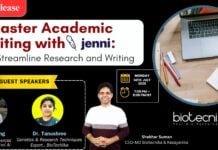Scientific Papers Are Getting Harder To Read?
Voice of BioTecNika – Episode No: 35
Pleasant and warm greetings to all the science enthusiasts present out there. If you have been an ardent follower of science and you work hard to keep yourself up-to-date with all that it has to offer, I am sure you will agree to the fact that “Science papers are actually getting harder to read.” Believe me, it is not just you, even the world statistics agree to the fact, that as science is evolving, the discoveries are getting more complex and definitely it is reflecting in our journals.
Hello and welcome back to Biotecnika’s very own – Voice of Biotecnika’s latest episode, where you will be exploring facts about why the claim is made so. Listen to the Podcast below to know Why Scientific Papers Are Getting Harder To Read?
Listen to Voice of Biotecnika Podcast on Soundcloud
There is a beginning to everything but science is the backbone of all conception. It started even before the Universe chose to exist because it laid down the principles on which the world stands today. From eminent names – Albert Einstein, Sir Isaac Newton, Galileo, Edison, Mendel, Koch
, Archimedes to the present day Jane Goodall, Late Stephen Hawking, Frederick Sanger and many more to come, all of them have worked hard in helping the world understand its surroundings. In the old days, all the findings were not preserved in a manner legible today, but as the days passed, the man figured out a way to save his data. The scientists took their predecessors to lead and began extending their research.Now as data accumulated, it had to be well presented and documented, to be easily accessed by all. Hence, started the science journals, where the findings could be announced and documented and even referred to when needed. Humans sound very organized. Yes, we are. But no matter how hard you try there will always be a loophole left out.
As we accumulated more and more data, there cropped up a need to limit the number of words or repetitive concepts used or the amount of research published in one paper. So, the best way out was to briefly introduce the topic and then begin explaining one’s own research with as much factual and experimental support as possible. So far so good. But over the years what has happened is that as science has seen a rapid pace of evolution and increasing depth, the journals, in turn, became harder to read.
You still sound unconvinced.
Well, try picking up a journal from last century and pick one from the present times. You will find that the hard phrases and terms used in the present day make the read more impenetrable to the average human. Let alone the scientific facts or terms that make the flow heavy, even the grammar that is used seems to follow the pattern. This has been labeled as the general scientific jargon. Words like ‘robust’, ‘significant’, ‘furthermore’ and ‘underlying’ are more frequently used than the simpler synonyms used before. However, such word power alone does not suffice the claim. It has been seen that the sentences that are framed are more technically phrased and gets more difficult to analyze.
Many may argue that the research article is meant for a scientist to learn and accumulate viewpoints. Very true, but at the same time, the research article has to be read by an academician, by a student, by any ordinary man seeking answers for a pestering concept. Then, why be cruel to him? It is seen in more than 30% of the random abstracts, that the English used in the construction of sentences is even beyond a college graduate level.
The irony is that now, researchers are even beginning to devise a way to bring down the difficulty level and the complex nature of the text used. In other words, make it more legible to every other man. Just because the science behind the working is getting more complex with every passing day, does not necessarily mean words and sentences should be getting longer as well.
Neuroscientist William Hedley Thompson from Karolinska Institute in Stockholm, Sweden, is of the opinion that, we may come up with a ‘readability index’, that could measure the clarity of the text used. Just how a language test score signifies the proficiency of a person in that subject, this would signify and be a measure of the article’s language proficiency. This, however, may be misused. It has to be accepted, that some science are very difficult to explain in simple sentence constructions. A lot of background data must be known to understand every concept penned. This, however, stands a concern for the general mass.
His study concludes that its findings ‘are concerning for scientists and for the wider public as they impact both the reproducibility and accessibility of research’. But Maxim Grechkin, a computer scientist at the University of Washington in Seattle, isn’t convinced that reproducibility is affected. ‘It might actually be simpler to reproduce a paper that refers to concepts precisely by their jargon, rather than dances around it,’ he says. ‘Jargon is useful to succinctly convey a piece of shared information from one researcher in the field to another.’
A recent analysis even concludes that one in every 300 of the words in journal articles are influenced by related Wikipedia pages. The decrease in the readability of the scientific excerpts is due to the change in the usage of words. It has also lead to an increase in the length of sentences. Words like ‘notes’ turn into ‘data’ and ‘observations’ turn into ‘results’. To make things worse, reading a paper actually becomes a tedious job and one may get tired or drifted away amidst the process. The challenge in easing this lies in the expertise of the author, the understanding of the subject and his literary skill set.
There is no uniform standard that can be observed and hence the trouble. The abstract in some cases may be absolutely on a different line than the matter spoken about in the body content. All these boil down to the efforts made by the researcher. One must keep in mind to put their thoughts in a legible manner with continuity in the text. The easier it is to understand, the more people will access it and the more benefit it will add to mankind. As a part of the scientific fraternity, it is our responsibility to follow the same when we publish articles and papers.
If you agree or disagree with these notions, please let us know by leaving your comments below, or by writing to us. Together we can build a better scientific platform that is informative and legible to the generations after us.
 most experienced & senior team members of Biotecnika. Coming from a research background in cancer, she specializes in Cancer Genetics, Immunology & Developmental Biology. She has a keen interest in understanding the latest developments in Biotech & Pharma Industry and is very passionate about educating the same to her students. This Podcast on – Scientific Papers Are Getting Harder To Read? has been compiled by her after thorough analysis and vast experience she holds in this field.
most experienced & senior team members of Biotecnika. Coming from a research background in cancer, she specializes in Cancer Genetics, Immunology & Developmental Biology. She has a keen interest in understanding the latest developments in Biotech & Pharma Industry and is very passionate about educating the same to her students. This Podcast on – Scientific Papers Are Getting Harder To Read? has been compiled by her after thorough analysis and vast experience she holds in this field. 





































You are absolutely right ma’am. I am Ph.D student in 4th year. Still I feel very hard in reading some papers.